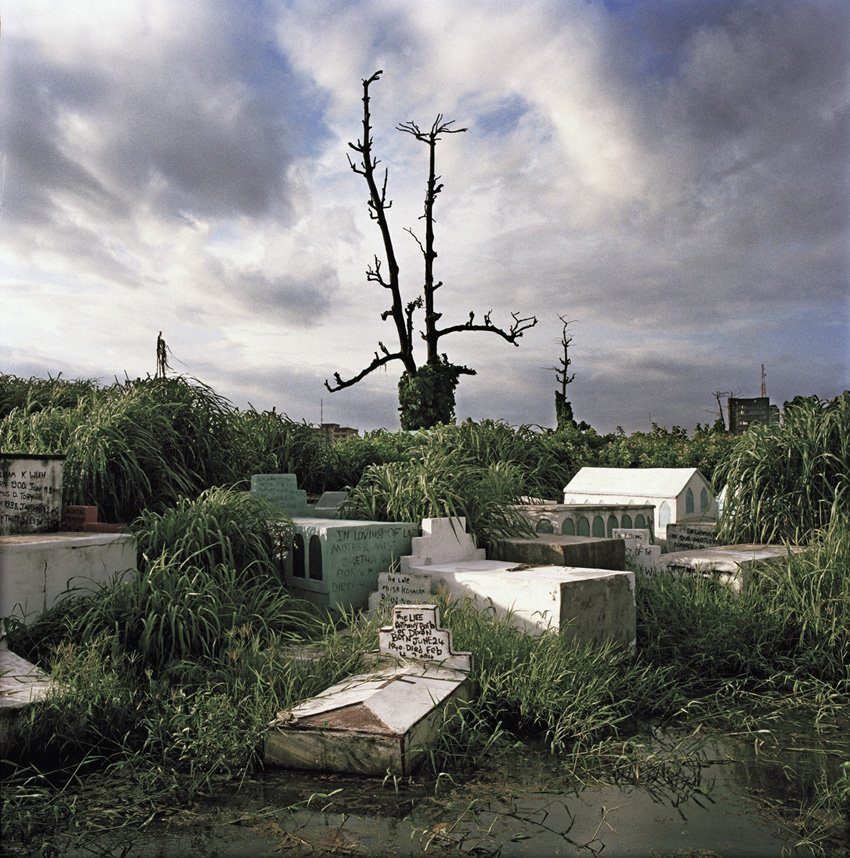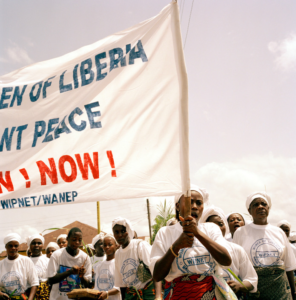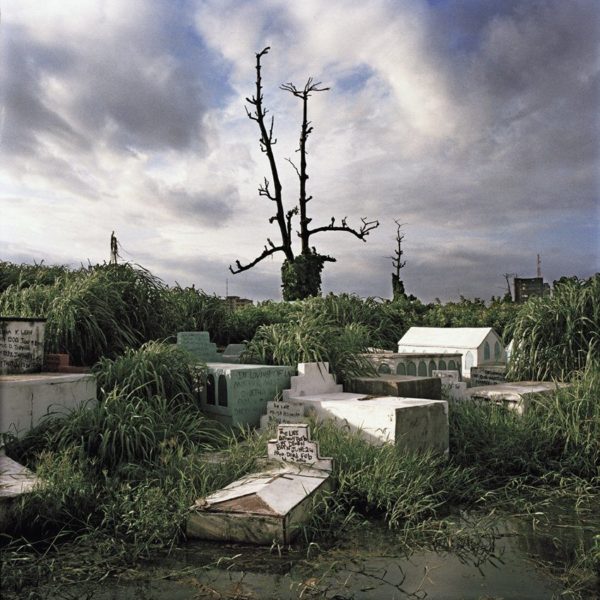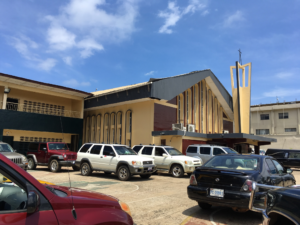

The Lutheran Church Massacre
Photos courtsey of Tim Hetherington Trust
CASE STATUS
Open
HUMAN RIGHTS ISSUES
COUNTRY
The massacre at Saint Peter’s Lutheran Church is one of the single deadliest attacks in Liberia’s history. On July 29, 1990, soldiers from the Armed Forces of Liberia (AFL) murdered approximately 600 unarmed men, women, and children who had sought refuge at the designated Red Cross shelter. CJA represents survivors and their families in their efforts to seek justice against one of the alleged commanders of the attack. We filed two cases to seek accountability for the Massacre: one with a U.S. federal court and one before the Court of Justice of the Economic Community of West African States (ECOWAS).
As the first Liberian civil war escalated with Charles Taylor’s rebel National Patriotic Front of Liberia (NPFL) approaching the capital city Monrovia in the spring and summer of 1990, Liberian civilians flooded into humanitarian aid centers and churches throughout the capital city in search of sanctuary from the growing violence. The Red Cross and the Liberian Council of Churches set up shelters, including St. Peter’s Lutheran Church in Monrovia, to house nearly 9,000 internally displaced people.
As rebel forces gained strength, the AFL grew more brazen and increasingly attacked civilians, specifically targeting members of the Mano and Gio tribes, who they believed were loyal to Charles Taylor’s rebel movement. By late July, as many as 2,000 civilians—mostly Manos and Gios—were sheltering in the Lutheran Church compound, sleeping in the church, its courtyard, and the school building. On the night of July 29, 1990, as NPFL forces closed in on Monrovia, AFL soldiers stormed the crowded St. Peter’s Lutheran Church compound and attacked the approximately 2000 civilians taking shelter inside.
Men, women, and children were gunned down as they attempted to flee. Many who survived the initial rounds of shooting were hacked to death with machetes as soldiers spread out over the compound, ensuring the slaughter was complete. Some people, including our clients, survived by hiding under piles of dead bodies until the soldiers left. Most sources estimate that over 600 civilians died over the course of that night.
In 2009, the Liberian Truth and Reconciliation Commission identified the Lutheran Church Massacre as one of the key atrocities of the Liberian civil wars. Despite widespread condemnation of the attack, little has been done by the Liberian government to further investigate or prosecute individual perpetrators. Nonetheless, survivors continue to demand justice. That is where CJA and the Monrovia-based Global Justice Research Project (GJRP) stepped in. Together, we investigated this historic atrocity and built a case against those responsible for the attack.
U.S. Litigation – Jane W et al. v. Thomas
 On February 12, 2018, CJA and pro bono co-counsel Debevoise & Plimpton, LLP filed a civil suit in a Philadelphia court on behalf of four Lutheran Church Massacre survivors and their families against Moses Thomas for his alleged role in the Lutheran Church massacre. Read the complaint, our motion for summary judgment, evidence, and the U.S. Court decision holding the AFL responsible for the attack.
On February 12, 2018, CJA and pro bono co-counsel Debevoise & Plimpton, LLP filed a civil suit in a Philadelphia court on behalf of four Lutheran Church Massacre survivors and their families against Moses Thomas for his alleged role in the Lutheran Church massacre. Read the complaint, our motion for summary judgment, evidence, and the U.S. Court decision holding the AFL responsible for the attack.
The suit alleges that Thomas, a former colonel in the Armed Forces of Liberia, led AFL forces in its attack on St. Peter’s Lutheran Church on the night of July 29, 1990. Thomas moved to the United States during Liberia’s Second Civil War. Around 2000, he settled in the Philadelphia area. As a longtime U.S. resident, he is subject to the laws and jurisdiction of U.S. courts.
The case was filed in the U.S. District Court for the Eastern District of Pennsylvania under the Alien Tort Statute and Torture Victim Protection Act. We alleged that Thomas is liable for extrajudicial killing, torture, war crimes, and crimes against humanity.
On March 16, 2021, CJA along with pro bono co-counsel Debevoise & Plimpton and Blank Rome LLP filed a motion for summary judgment, supported by evidence developed over a seven-year investigation. The motion argued that the record developed in this case makes clear Moses Thomas’ responsibility for the massacre, and requested that the court find Thomas liable for torture, extrajudicial killings, war crimes, and crimes against humanity.
On September 15, 2021, Judge Tucker of the U.S. District Court for the Eastern District of Pennsylvania granted the motion for summary judgment finding Moses Thomas liable for torture, extrajudicial killing, and attempted extrajudicial killing under the Torture Victim Protection Act, as well as for war crimes, crimes against humanity, and cruel, inhuman, or degrading treatment under the Alien Tort Statute. In reaching this decision, the Court emphasized the obstacles faced by the Plaintiffs and other survivors of the massacre in their efforts to seek justice in Liberia, and the lack of domestic criminal or civil accountability for civil war atrocity crimes to date. This decision is the first to bring any form of accountability for one of the largest civilian massacres in Liberia’s history, to recognize the Lutheran Church Massacre as a war crime and crime against humanity, and the first to hold a member of the Armed Forces of Liberia responsible for abuses committed during Liberia’s First Civil War. On August 16, 2022, the Court ordered Thomas to pay each plaintiff $6 million in compensatory and $15 million in punitive damages, totaling $84 million in damages to redress the brutality and egregiousness of the Lutheran Church Massacre and its ongoing impact on each of the plaintiffs. In reaching its decision, the Court emphasized that despite international condemnation labeling the massacre as one of the worst single episodes of the Liberian civil wars, Moses Thomas has never been subject to criminal proceedings for leading the attack. In 2019, Thomas left the United States and returned to Liberia. While Liberia’s Truth and Reconciliation Commission has recommended investigation into his role in the Lutheran Church Massacre, he will continue to live freely in Liberia until the government there takes action.
Read the court’s full decision and check out a multimedia exploration of the evidence in the case.
ECOWAS Litigation – GJRP et al. v. Liberia
On October 4, 2022, CJA, the Institute of Human Rights and Development in Africa (IHRDA) and pro bono co-counsel Debevoise & Plimpton, LLP filed a suit in the ECOWAS Community Court of Justice on behalf of Liberian NGO the Global Justice and Research Project (GJRP) and three survivors of the Lutheran Church Massacre against the Republic of Liberia for its failure to hold the perpetrators of the Massacre to account. Read the complaint and one of the survivor’s statements detailing the Massacre and its aftermath.
The complaint alleges that Liberia is breaching the fundamental human rights of the survivors and victims of the Lutheran Church Massacre by failing to investigate the Massacre and prosecute those responsible. Moses Thomas returned to Liberia in 2019. Despite all of the evidence against him, including the evidence considered by the court in our U.S. case in finding AFL soldiers under Thomas’s command responsible for the attack, he has not been subject to any criminal investigation. Nor has there been any other person held to account for the Massacre. Decades after the Massacre, the government of Liberia continues its failure to remedy the injustice carried out by its own armed forces against the Liberian people.
We’re asking the ECOWAS Court to find that Liberia has violated its human rights obligations under the African Charter on Human and People’s Rights, the International Covenant on Civil and Political Rights, the UN Convention Against Torture and the Geneva Conventions, and to order Liberia to immediately conduct an effective investigation and where appropriate, prosecute those responsible for the Massacre. We also ask the Court to order Liberia to compensate the victims of the Massacre and their families, and to take steps to memorialize the attack.
Read our Questions and Answers for more information on our ECOWAS case.


